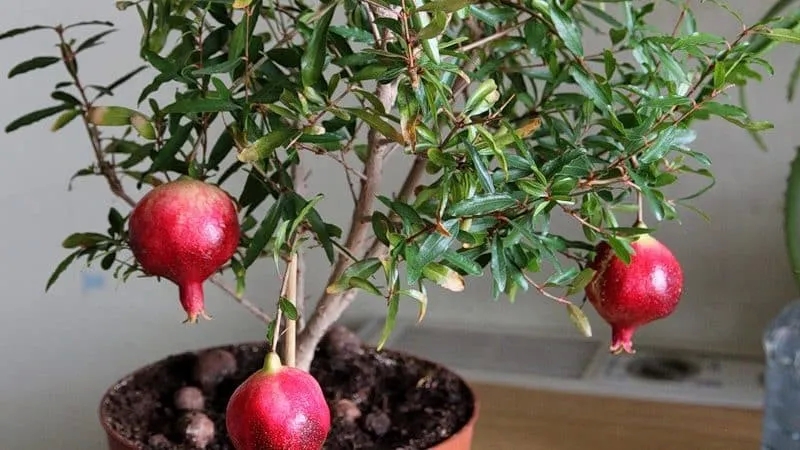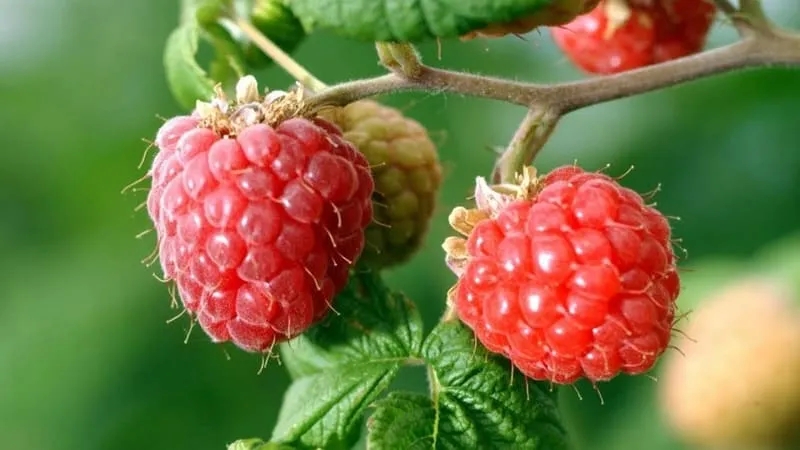“Small, round, and filled with red beads” – that’s how an old European riddle describes the king of fruits. Another name for this celebrated berry is the “apple of paradise” or “grainy apple” – not just any apple, but the very one that led to Adam and Eve’s expulsion from Eden. This refers, of course, to the pomegranate, a true elixir of health. We’ll explain how to eat pomegranate – with or without seeds – and share easy methods to peel its tightly clinging skin.
Table of contents
Who Can Eat Pomegranate
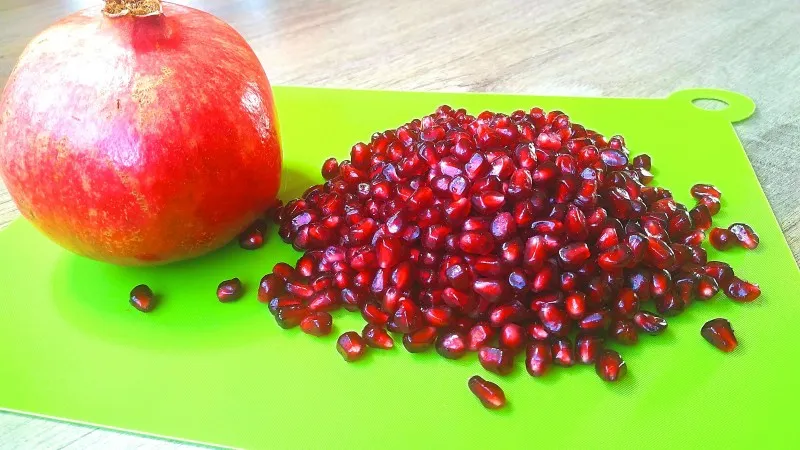
Pomegranate is safe for everyone, except those with specific dietary restrictions due to health conditions.
Is It Safe for Children?
Pomegranate can be introduced from the first year of life, but only if the child has no predisposition to allergies. Due to its high acid content, it should be introduced carefully, ideally as juice diluted with water (1:1). Start with 30 ml, but never exceed 100 ml of diluted juice per day, 2-3 times a week.
A toddler aged 2-3 can try the seeds or drink up to 250 ml of juice, while a 7-year-old may consume up to 400 ml of undiluted juice per day.
If a child accidentally eats a piece of the peel – which contains strong alkaloids affecting multiple body systems – provide plenty of water or consult a paediatrician. Swallowing a few seeds whole is harmless, but excessive amounts may cause digestive issues, bloating, or constipation.
Important! Children, pregnant women, and those with sensitive teeth should drink pomegranate juice through a straw, as its acids can erode enamel. Before eating pomegranate, brush your teeth or chew some cheese to create a protective layer. Always rinse your mouth with water afterward to maintain strong enamel.
Is It Safe During Pregnancy and Breastfeeding?
If the mother is healthy, pomegranate serves as an excellent source of nutrients, boosts appetite, quenches thirst, prevents swelling, and helps with:
- colds and coughs;
- iron-deficiency anaemia;
- high blood pressure.
This highly effective, natural immune booster has anti-inflammatory, antiseptic, and pain-relieving properties.
Avoid pomegranate during pregnancy if you have:
- allergies;
- heartburn;
- constipation;
- low blood pressure.
Breastfeeding mothers should introduce pomegranate cautiously, ideally when the baby is 3-4 months old. Start with a small portion at lunchtime and monitor the baby’s reaction. Always remove the seeds to prevent colic or constipation in the infant.
Health Benefits
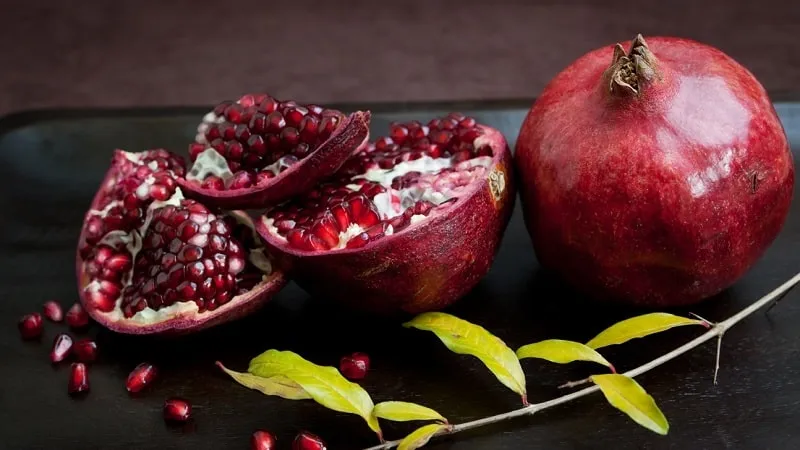
Pomegranate’s health benefits have been known for centuries. Regular consumption positively affects:
- the immune system (vitamin C);
- blood vessels (vitamin P);
- the nervous system (vitamin B6);
- blood formation (vitamin B12).
Pomegranate contains:
- tannins with strong disinfectant properties – helpful against tuberculosis, dysentery, and intestinal viruses;
- nicotinic acid – improves vision and breaks down cholesterol plaques;
- vitamins B1 and B6 – help manage physical and emotional stress;
- iron – boosts haemoglobin levels;
- amino acids – aid in protein cell formation;
- punicalagin, a powerful antioxidant – neutralises free radicals and detoxifies the body;
- vitamins F, E, A – rejuvenate skin cells;
- dietary fibre – supports digestion;
- alkaloids – help expel intestinal parasites;
- phytohormones – balance hormones during menopause and improve male potency.
Dried and ground pomegranate peel is rich in tannin, which effectively treats diarrhoea after just one use. The powder also aids in healing minor skin wounds.
Pomegranate has a strong whitening effect, making it useful against freckles and pigmentation. Regular consumption may prevent stomach cancer, while its pulp and juice help remove radioactive elements from the body.
Pomegranate juice boosts appetite, acts as an antiseptic and diuretic, regulates blood pressure, and benefits liver, kidney, and lung health.
Did you know? Opera singers drink a glass of pomegranate juice before performances to strengthen their voices. It can even substitute for lipstick if applied generously.
Ground seeds relieve headaches, lower blood pressure, and support hormonal activity. Essential oils from the seeds are used in cosmetics, while the peel is used in dyes.
A decoction of pomegranate peel helps with colds, stomatitis, gum bleeding, and hangovers.
Tea made from dried membranes soothes nerves, promotes relaxation, and combats insomnia.
How to Choose a Ripe Pomegranate
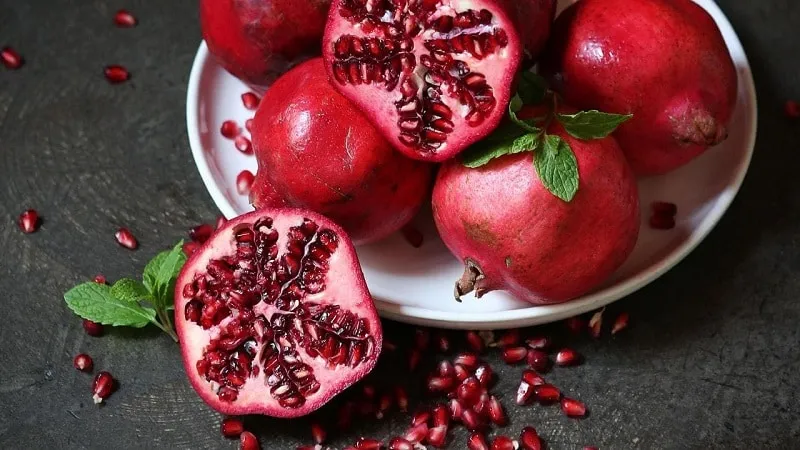
Signs of a ripe pomegranate:
- thin, slightly dry, firm skin tightly hugging the seeds, in a rich brown hue with pink or orange undertones, free of blemishes;
- the fruit feels heavy for its size, with no hollow spots – a sign of juicy seeds;
- the crown is dry, clean, and matches the skin colour;
- tapping the fruit produces a metallic sound, and pressing lightly yields a crunch of seeds;
- a ripe pomegranate has no strong odour, and its seeds are sweet and juicy.
Avoid fruits with brown spots, overly dry or smooth skin, or soft spots when pressed.
How to Peel a Pomegranate Easily
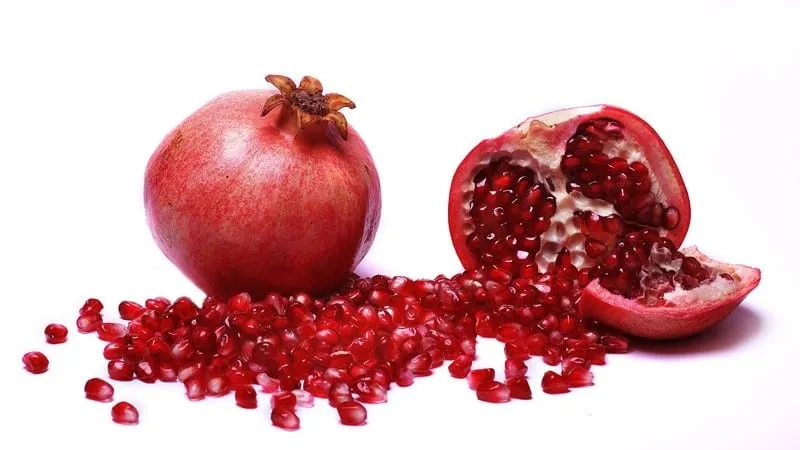
Here are three simple peeling methods.
Method 1 (Classic):
- Place the fruit on a cutting board and slice off the crown.
- Make shallow cuts along the white membrane lines.
- Hold the fruit cut-side down over a bowl and gently press the centre to separate it into wedges.
- Invert the wedges to release the seeds.
Method 2 (Water Method):
- Score the skin in four sections without cutting deep.
- Submerge the fruit in a bowl of water for 10-15 minutes.
- Break it apart underwater, separating seeds from membranes.
- Discard floating debris, drain the water, and collect the seeds.
Method 3 (Spoon Technique):
- Cut off the top, then score along membrane lines.
- Open the sections slightly.
- Hold over a bowl and tap the skin with a spoon to release seeds.
How to Eat It
Enjoy pomegranate fresh or use it in cooking. Its juice is a health powerhouse, perfect for sauces, smoothies, or cocktails. Add seeds to salads, desserts, or meat dishes. Grenadine syrup and pomegranate wine are also popular.
Can You Eat the Seeds?
Pomegranate seeds are packed with nutrients. Chew them thoroughly to maximise benefits. Swallowing whole seeds in large amounts may cause digestive discomfort.
Daily Intake Recommendations
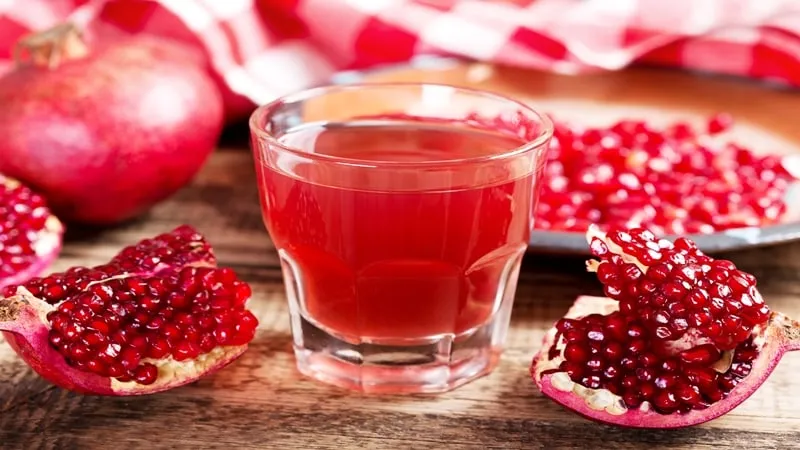
Recommended daily amounts:
- Men – up to 3 fruits or 150 ml of juice daily.
- Women – up to 2 fruits or 75 ml of juice daily.
- Children (3-7 years) – ½ fruit or 250 ml juice, 2-3 times weekly.
- Children (7-14 years) – up to 400 ml juice, 2-3 times weekly.
The ideal time to consume pomegranate is 30-40 minutes before or after meals. Avoid eating it on an empty stomach or before bed.
Contraindications
Avoid pomegranate if you have:
- gastritis, high stomach acidity, or peptic ulcers;
- chronic constipation;
- weak enamel or untreated cavities;
- low blood pressure;
- infants under 1 year.
Children with allergies should wait until age 4 before trying pomegranate.
Conclusion
Pomegranate’s healing properties have stood the test of time. This natural remedy boosts vitality, strengthens immunity, and enhances overall well-being. All you need is to embrace this gift of nature wisely for lasting health benefits.

